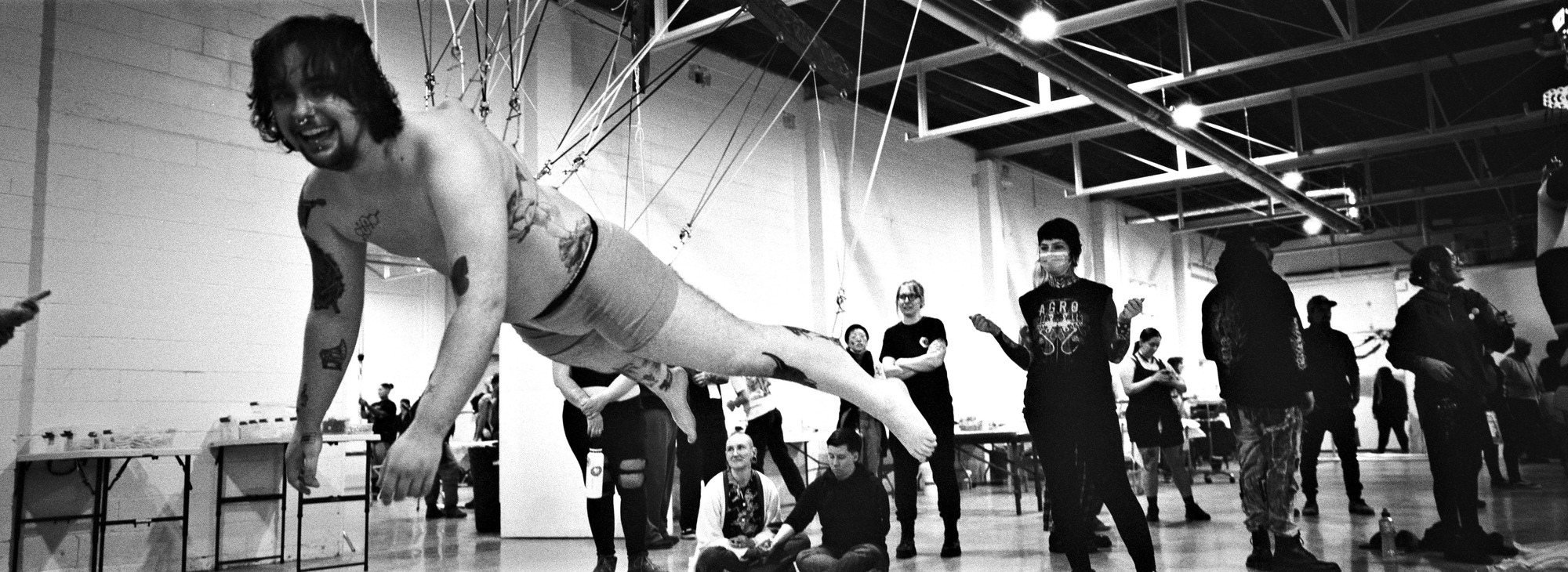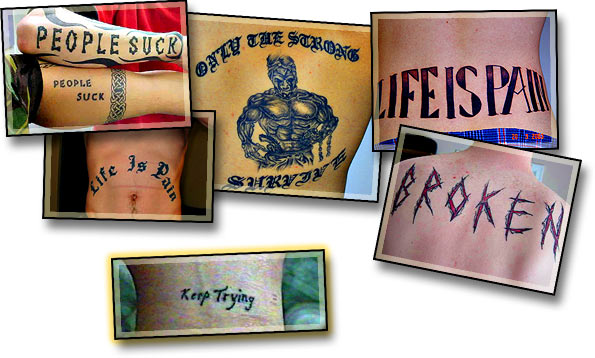
Does God Hate Your Tattoos? |
“For no man ever yet hated his own flesh; but nourisheth and cherisheth it, even as the Lord the church.”
– Ephesians 5:29
|
Way back in 1995, about a year after starting BME, I received the following semi-literate email:
“I think you are doing is self mutilation and I for one am very disgusted. But there is hope for you! Read the BIBLE!”
It may come as a surprise that I actually have read the Bible, and it no more says “don’t get tattoos” than it says any number of other cultural concepts — not theological concepts — such as “spare the rod, spoil the child.” In fact, the Judeo-Christian family of faiths is full of tattooed and pierced characters, and parts of the Bible are very clear that extreme modifications — self-amputations even — are what God wants for some people. Under Christian theology, body modifications are like words — they’re tools. They can be used to bring glory to God and help live a good life, or they can do the opposite.

There are many parts of the Bible that mention piercing in passing since it was relatively normal in Biblical times, but the only passage that seems to even vaguely ban body modification — tattoos* in this case — is of course Leviticus 19:28, which reads,
“Ye shall not make any cuttings in your flesh for the dead, nor print any marks upon you: I am the LORD.”
|
* I should note that the original Hebrew text reads “k’thoveth qa’aqa”, or “writing that is stuck in”, usually used to refer to a form of modification closest to ink rubbing — a pagan funerary rite at the time, very different from modern tattooing. |
Leviticus is a book of laws telling the Jews of the time how to lead their lives. As such, the laws break down into three general types — first, laws regarding morality (bans on prostitution, bestiality, and so on); second, laws regarding health (advice on subjects such as food preparation — kosher laws); and third, laws to differentiate the Jews from the pagans (bans on certain rituals, haircuts, and so on). In the New Testament Jesus does away with these laws. That doesn’t mean that bestiality is suddenly OK, but it does give a modern Christian much more personal freedom in terms of things like the way they trim their beard and the way they choose to decorate their bodies, because they are now judged by their faith, rather than adherence to a set of hard and specific rules.
“Therefore we conclude that a man is justified by faith without the deeds of the law.”
– Romans 3:28“Let no man therefore judge you in meat, or in drink, or in respect of an holyday, or of the new moon, or of the sabbath days.”
– Colossians 2:16
This is explained perhaps more clearly in Galatians 3:23-24, which tells how Jesus replaced the old covenant with a new one:
“But before faith came, we were kept under the law, shut up unto the faith which should afterwards be revealed. Wherefore the law was our schoolmaster to bring us unto Christ, that we might be justified by faith. But after that faith is come, we are no longer under a schoolmaster.”
As well as the mention of tattooing or cutting in Leviticus, body piercing is also mentioned throughout the Bible. When the Israelites fought the Ishmaelites, Gideon told his warriors that they could take the golden earrings of the enemies they slew (Judges 8:24), and numerous passages mention the piercings of the Israelites as well (Exodus 32:3, Ezekiel 16:12, Isaiah 3:21, and so on). Other sections, in Deuteronomy 15 and Exodus 21 describe body piercing on servants (as a normal part of society), and nose piercing is described as beautifying and normal when Behuel and Nahor’s daughter is married in Genesis 24.
Sometimes Christians object to body modification on the basis of it defiling God’s creation — after all, 1 Corinthians 6:19-20 is fairly clear that the body is the temple,
“What? Know ye not that your body is the temple of the Holy Ghost which is in you, which ye have of God, and ye are not your own? For ye are bought with a price: therefore glorify God in your body, and in your spirit, which are God’s.”
Earlier, in 1 Corinthians 3:17, a dire warning is issued:
“If any man defile the temple of God, him shall God destroy; for the temple of God is holy, which temple ye are.”
The question is, what does “defile” mean?
I’ll spare telling you that the Catholic Church has already publicly proclaimed tattoos as acceptable, and that Crusaders were commonly covered in Christian tattoos in order to proclaim their faith and ensure a proper burial — A good way to understand what’s appropriate for a temple is to look at the range of Christian churches that history has produced. Until about the 10th century A.D., Christian architecture was largely reminiscent of earlier Roman buildings. In the Middle Ages huge Cathedrals dominated, covered in spires, sculptures, buttresses — anyone who’s been in these structures knows how overwhelmingly powerful they are psychologically.
The Gothic period produced churches with complex and intricate decoration and gorgeous glasswork. Centuries later in the Baroque era churches were less physically imposing, but were encrusted with wealth — golden opulence was used to manifest God. Other periods and areas have seen simple churches, small humble buildings relatively unadorned with the people themselves bringing the glory, and in modern times we’ve seen churches constructed in every conceivable style. We’ve even seen very successful temples built using nothing but television transmissions and a studio.
Marshall Mcluhan may be oft-quoted saying that the medium is the message, but in this sense, I think God might correct him and say, “No, Marshall, it doesn’t matter what the medium is — it’s the message that counts.”

I hope it’s clear that if we’re to speak in objective terms, that there’s no specific ban on body modification in the Bible, and that its value as something good in one’s a life versus its involvement in sin is very much determined by the way it’s being used — to put it another way, telling someone that their Christian tattoo is wrong would be no better than telling someone that praising God is wrong because someone else shouted blasphemies. Speech — and tattoos — are just a part of life. They can be right, or they can be wrong.
So a Christian certainly can’t go out and get a tattoo or other body modification if it leads to sin, or stands for sin, but modification — mutilation even — is acceptable if it helps the person lead a righteous life. Sex might be another good example. The Bible is full of things that could make a person believe that sex is a bad thing — prostitution, lusting after others’ wives, and forms of masturbation are all mortal sins. However, reading other parts of the Bible it’s clear that God intended sex to be something wonderful — but He wanted it to be used in the right context (a loving marriage under God).
“Thy two breasts are like two young roes that are twins, which feed among the lilies.
Until the day break, and the shadows flee away, I will get me to the mountain of myrrh, and to the hill of frankincense.
How fair is thy love, my sister, my spouse! how much better is thy love than wine! and the smell of thine ointments than all spices!
Thy lips, O my spouse, drop as the honeycomb: honey and milk are under thy tongue; and the smell of thy garments is like the smell of Lebanon.
A garden inclosed is my sister, my spouse; a spring shut up, a fountain sealed.
A fountain of gardens, a well of living waters, and streams from Lebanon.
Awake, O north wind; and come, thou south; blow upon my garden, that the spices thereof may flow out. Let my beloved come into his garden, and eat his pleasant fruits.
Open to me, my sister, my love, my dove, my undefiled: for my head is filled with dew, and my locks with the drops of the night.”– The Song of Solomon
It’s all about context. That which might be a sin when used against God is a beautiful thing when used for Him — it’s why a Christian couple can have a fulfilling and guilt-free sex life that involves bondage, anal sex, oral sex, Cleveland steamers, or whatever else makes them happy — as long as it’s loving and sanctifies the marriage bed (so no Cleveland steamers with the neighbors when the wife’s out of town!).
To give a more extreme example, eunuchs (castrated or even penectomized men) were common throughout various cultures in Biblical times, and hence came to be included in the Bible and were even embraced by several sects. The Byzantine Church had numerous eunuchs in ruling positions, and the Christian Coptic Church embraced castration as a holy path. While relatively common between 300 A.D. and 1,100 A.D., it continued in eastern Europe until surprisingly recently. Matthew 18:8-9 warns,
“Wherefore if thy hand or thy foot offend thee, cut them off, and cast them from thee: it is better for thee to enter into life halt or maimed, rather than having two hands or two feet to be cast into everlasting fire. And if thine eye offend thee, pluck it out, and cast it from thee: it is better for thee to enter into life with one eye, rather than having two eyes to be cast into hell fire.”
Matthew 19 continues, warning against adultry and other sins of the flesh, and in verse 12 says,
“There be eunuchs, which have made themselves eunuchs for the kingdom of heaven’s sake. He that is able to receive it, let him receive it.”
Even extreme body modification is permissable — if it’s done to serve God or to protect the individual from falling prey to sin or to God’s enemies. Of course, modern Christians on the whole believe this passage is “metaphorical”… but there’s certainly nothing that says that clearly, and if it’s metaphorical, how can one decide what else is as well? Many early Christian scholars such as Origen, considered one of the fathers of the faith, castrated themselves. A small number of patristic writers such as Tertullian actually referred to Jesus as a eunuch.
So what we see in the Bible is that Christianity has at best one highly vague ban on a specialized form of cutting, and then goes on to describe body piercing at length as normal, and even goes so far as to encourage extreme body modification when done for the sake of God. The New Testament contains one clear and overwhelming message: Love. Under Christian theology the whole point of God’s appearance on Earth as Jesus was to get rid of blind arbitrary rules, and replace them with a more fluid code of goodness.
“This is my commandment, that you love one another, just as I have loved you. Greater love has no one than this, that one lay down his life for his friends. You are my friends, if you do what I command you.”
– John 15: 12-14
I won’t get into it in this article in any depth, but the Bible also draws similar conclusions about ritual. In 1 Kings 18 and Mark 5 we hear descriptions of pagan sorcerers and priests performing rituals involving cuttings and bloodletting, but at the same time, Christian penitents and monks have been performing self-flagellation and even crucifixion in the name of their faith (Matthew 16:24) since the beginning — not a single early Christian church didn’t embrace these rituals and they are still popular in many areas such as Brasil and the Philippines. Again, it’s all a matter of what you’re using the tool to achieve.

Some Christians will warn others against involving themselves in tattooing or piercing because they perceive it as being sordid, using scripture such as Romans 12:17 to justify it,
“Recompense to no man evil for evil. Provide things honest in the sight of all men.”
However, it should be clear from the “double standards” in the Bible that God doesn’t believe that one should censor oneself because someone else has used a tool for evil. You can wield a sword in God’s army, or you can wield in as knight in Satan’s service — your final resting place is not determined by the sword, but by the army you choose to serve in. When Paul says in Philippians 4:8,
“Finally, brethren, whatsoever things are true, whatsoever things are honest, whatsoever things are just, whatsoever things are pure, whatsoever things are lovely, whatsoever things are of good report; if there be any virtue, and if there be any praise, think on these things.”
he isn’t saying to think of things that appear to be true, or appear to be honest, or appear to be just, pure, or lovely — he’s giving clear message in clear terms: be a good person and put Jesus above all else.
If you want to be a good person with tattoos, God will still love you. The Christian who tells you otherwise isn’t hearing the message for some reason and may need your help far more than you need theirs.

Shannon Larratt
BMEzine.com
PS. I am not a Christian, but if you’d like to meet other Christians interested in body modification, you can click here to meet them in the new BME Personals (or place your own ad), and there are of course many more on IAM — a few are linked in the interview above.




































